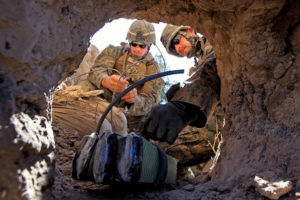
Veterans are good at blowing stuff up.
For most veterans, blowing stuff up is a skill that is taught in basic training. How to throw a grenade. How to place a Claymore mine. How to fire an AT4, a shoulder-mounted rocket. For some veterans, their occupational specialty taught them how to handle ordnance and explosives, to build them and employ them and use them for stuff. Just the right amount of explosives can open a locked door, or take down the entire building.
Before anyone who reads this gets offended at a celebration of violence and destruction, that’s part of what being in the military is about. I don’t mean to say that all veterans gleefully employ destructive means to accomplish simple tasks, but the truth is that the purpose of the military is to fight and win our Nation’s wars. That can’t be done with rocks and sticks.
The problem with explosives is, sometimes they can get us into trouble. Way back in the mid ‘90s, a team of us went to Norway on a mission to support a joint NATO exercise. A friend of mine introduced me to the awesomeness that is an “MRE Bomb.” The rations that veterans are given, Meals Ready to Eat (MREs), come with a flameless heater that uses a chemical reaction that is activated by water to heat the meal. By crushing up some MRE heaters, putting it in a bottle, adding water, and putting the cap on, the escaping gasses will expand to the point where it will cause the bottle to explode with a loud but harmless noise.
Our tent was located at the back of an area that had been plowed clear, and was up against a snow berm that must have been eight or ten feet tall. After putting a couple of these MRE Bombs together, my buddy and I threw them over the snow berm to wait for the explosion; we got our explosion, all right, but what we didn’t know what that the motorpool for the Norwegian Army was on the other side. We figured out pretty quick, though, by the sounds of shouting and running and yelling.
Another interesting fact about the military: punishments can be just as creative as the transgressions that cause them. Have you seen the guy at the airport with the cone flashlights guiding the airplane? They need that for helicopter landing zones, too. Especially at midnight. In the snow. Twenty miles south of the Arctic Circle. Needless to say, we didn’t make any more MRE bombs on that particular trip.
Fun stories and inventive punishments aside, destruction is something that veterans are good at. The majority of us don’t handle live ordnance or explosives after we leave the military, but we often do sabotage our lives by metaphorically blowing stuff up.
A mentor of mine once described our emotions as bottles and jars in a cabinet, but anger is the one jar that we shook up and sprayed all over the other emotions. It has been variously described as a cork, a method of control over ourselves and our environment, and a blanket. Whatever metaphor you’d like to use, anger is another thing that veterans are good at, and the literal destructive power of explosives partners well with the figurative destructive power of anger.
Many of the veterans I work with find themselves in situations where they feel as though they need to throw a figurative grenade and walk away. School not going the way we’d like? @#%$ it, I’m done. Didn’t really want to do it anyway. Job too much of a hassle? Pop a grenade, I’m outta here. Relationship not working out? Fine. Drop a thermite grenade and watch it burn (figuratively, of course).
The problem is, when we do this too often, all we see around us is the shattered remains of our destructive tendencies. Looking around at a destroyed wasteland makes us angrier, which causes a downward spiral of pain and loss, leading to more frustration, anger, and depression.
There is a time and a place for explosives, and it’s not in our post-military lives. Solving problems in this way can be debilitating to both ourselves and those around us. The challenge is that when we are in the emotional state to want to use figurative explosives in our lives, we are less likely to use rational, conscious measures to figure out the problem. If school isn’t working out, then maybe we’re not going after the right degree. If work is a challenge, we don’t have to rage quit, we can figure out a different way to engage or, if it’s still not working out, to disengage. And if our relationships are not working out the way we expect them to, an honest look at our own actions and the dynamics between us and our partner is a much better way of solving whatever problems there are than just blowing the relationship up.
If you’re a veteran, and you’ve had some challenges in your post-military life, it may be helpful to take a good look at how you address those challenges. Are you throwing a grenade and walking away, explosions in the background like some Hollywood war flick? Sure, there are times when we want to do that, it’s a fantasy response. Urges are okay, as long as you don’t act upon them if they are harmful to yourself or others. But taking the time to understand how we approach these problems, and solving them in a more deliberate and less destructive way, can give us the stability we are looking for.
Who we were is no longer who we are, and we can leave the bullets and bombs in the past, where they belong.



